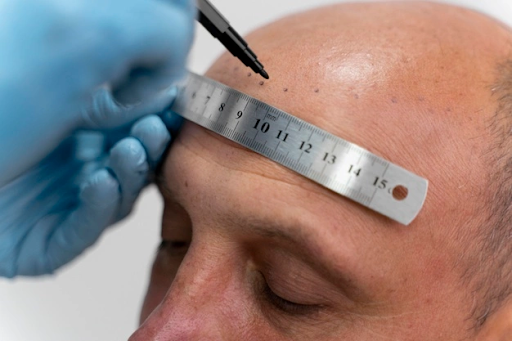Castor oil has been used for centuries to help enhance hair health and growth. This unique vegetable oil contains beneficial fatty acids and antioxidants that nourish the scalp and strands. Using castor oil for hair as a hair oil provides a natural solution to common hair woes like thinning, breakage, and dandruff. Keep reading to learn how castor oil can transform your hair.
Section 1: Composition and Benefits of Castor Oil for Hair
Castor oil is derived by cold-pressing the seeds of the castor oil plant, also known as Ricinus communis. It has a distinctive thick, sticky texture and potent nutritional profile. Some of the key components in castor oil responsible for its hair-helping abilities include:
– Ricinoleic acid – A type of fatty acid with anti-inflammatory and antioxidant properties. Makes up over 85% of castor oil.
– Omega-6 fatty acids – Help nourish hair follicles and increase circulation to stimulate growth.
– Vitamin E – A fat soluble antioxidant that defends against damage from free radicals.
– Minerals like zinc and selenium – Important for healthy hair metabolism and production.
This nourishing blend makes castor oil ideal for treating hair concerns like thinning, loss, dryness, and scalp conditions. The oil coats each strand to condition, soften, and add shine. It also helps thicken hair over time with regular use.
Section 2: Using Castor Oil as a Hair Oil
Using castor oil as a hair oil allows you to take advantage of all its beneficial properties. Here’s how to incorporate it into your routine:
– Application – Apply 1-2 teaspoons of castor oil to dry or damp hair. Gently massage into scalp and coat strands, focusing on mid-lengths and ends. Use amount needed to fully coat hair.
– Leave-in conditioning – For deeper conditioning, apply castor oil to damp hair and let sit for at least 30 minutes before washing and styling as normal.
– Overnight treatment – Cover hair in castor oil, put on a shower cap, and leave on overnight. Wash out thoroughly in the morning for hydrated, shiny hair.
– Scalp massages – Gently massage castor oil into the scalp to increase circulation and improve absorption. Do this 1-2 times per week.
– Heat application – Warm castor oil slightly by placing the bottle in a bowl of hot water for a few minutes before applying. This helps the oil penetrate better.
– Conditioning boost – Add 1 teaspoon of castor oil to your usual conditioner and apply as normal for extra moisture.
– Dandruff relief – Dab castor oil onto the scalp to hydrate and soothe flaky, itchy skin.
Section 3: Maximizing Castor Oil’s Effects on Hair
Follow these tips to get the most out of using castor oil on your hair:
– Focus castor oil on the scalp and roots to promote growth. Only use small amounts on hair ends which can look greasy.
– Pair with essential oils like peppermint, rosemary, or tea tree for added hair-boosting benefits. Just add a few drops into the castor oil.
– Use consistently 1-2 times per week for at least 2-3 months to see best results in increasing fullness and reducing hair loss.
– Combine castor oil with coconut or olive oil for a deeply moisturizing hair mask. Apply for 30-45 minutes before shampooing.
– Avoid getting castor oil on the face or near eyes as it can cause irritation. Use a towel to wipe away any excess.
– Rinse hair thoroughly after castor oil use with a clarifying shampoo. Condition well afterward.
– Store castor oil in a cool, dark place to prevent oxidation. It has a long shelf life of up to 2 years.
Section 4: Types of Castor Oil for Hair
There are a few varieties of castor oil to consider:
– Cold-pressed – This is raw, pure castor oil that retains the most nutrients. No heat or chemicals are used during extraction.
– Jamaican black castor oil – Roasted castor beans give this oil a dark color. Imparts extra thickness and sheen.
– Hydrogenated castor oil – Castor oil that has undergone hydrogenation for a thicker consistency. Use sparingly.
– Organic castor oil – Made from castor beans that were not treated with pesticides or chemicals. Considered the highest quality for hair.
Section 5: Safety Tips When Using Castor Oil
When incorporating castor oil into your hair care routine, keep these precautions in mind:
– Perform a patch test on the arm before using on the scalp to check for allergic reactions.
– Stop use if any irritation, itchiness, or redness occurs. Seek medical care for severe reactions.
– Avoid getting castor oil in eyes as it can cause burning or blurred vision.
– Monitor children when using castor oil and keep out of their reach.
– Use sparingly on babies and young children, as it may be overly stimulating.
– Speak with a doctor before using if pregnant, nursing, or taking medication, as interactions are possible.
– Never ingest castor oil without medical supervision due to its potent laxative effects.
Conclusion
Castor oil is a hair nourishing powerhouse packed with fatty acids, vitamin E, and minerals. Used regularly as a hair oil, it can help treat thinning, excess shedding, dandruff, and damage. Follow proper application techniques and precautions to transform your hair’s health, thickness, and shine with this natural remedy. Soon you’ll be flaunting gorgeous, full locks with the help of castor oil.






